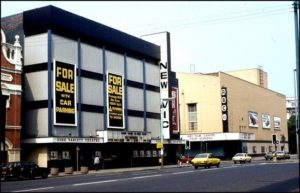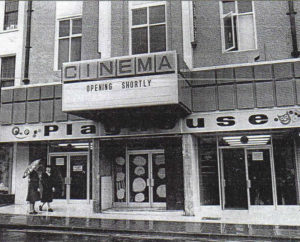Screening in a Conflict – The Impact of the Troubles on Cinema in NI – Part 2
Part 2: ‘Real Danger’In his final exploration of the history of cinema in NI, Sam Manning takes an in depth look at the impact of the Troubles on film exhibition from 1968 onwards.
The real danger often started once the film ended and, in several instances, had devastating human consequences. In the 2018 documentary Survivors, Mary Hannon-Fletcher recalled seeing The Godfather: Part 2 at the ABC. On her walk home from the cinema she ‘saw a car slow down and guns pointed out of it. And I thought I was imagining it, so I turned and looked at [my date] and said “I think they’re going to shoot us” fully expecting him to say “don’t be daft, you’re imagining you’re still in The Godfather.”’ After an explosion she lay on the floor pretending to be dead. Mary then realised they were still shooting: ‘Whenever it was all over I tried to get up and I couldn’t get up…I was in no pain at all… I was fine, I thought, but I couldn’t get up’. At the age of eighteen she was left paralysed.

Given such incidents, it is unsurprising that a 1974 survey revealed only one-third of Northern Ireland’s population still attended the cinema regularly. Over 80 per cent of those who no longer went to the pictures cited the Troubles as the most significant factor. But these figures hide geographical variations in cinema attendance across Northern Ireland.
In the same year, the Belfast Telegraph’s David Melton commented that the ‘situation in the country areas is, if anything, worse than in the cities. With the closure earlier this year of the Picture House in Portadown, it is now possible to drive from Belfast to Londonderry via Lisburn, Lurgan, Portadown, Dungannon, Omagh and Strabane and not encounter a single operational cinema in these towns’.
Part of the problem was the lack of investment in cinemas, a situation heightened when the Rank Organisation pulled out of the province in 1974. Its cinemas were acquired by a consortium of local businessmen, who sold off less profitable sites, such as the Capitol, which was then replaced by a supermarket. In 1975, BBC Northern Ireland’s Scene Around Six programme interviewed Brian Keenan, who, in a comment that could easily apply to the recent demolition of the Dublin Road Movie House [in 2021], stated that there is ‘a shortage of leisure facilities in this community and I think it would be a very serious thing if cinemas were turned into offices or shops or some other kind of commercial development’.
The sad truth was that it made more economic sense to demolish rather than renovate and redevelop existing cinemas.
Two years later, Derek Murray examined the decline of Northern Ireland cinemas for UTV’s Counterpoint programme, claiming that it ‘was once traditional as Irish linen, but now it’s a diminishing industry, perhaps because of the draw of other entertainments, perhaps because of the Troubles’. Murray interviewed cinema operators, such as John Gaston, co-owner of the Curzon cinema, who emphasised the difficulties of running a family-owned cinema and hinted that they achieved their best numbers by showing family entertainment during the school holidays.

The report suggested there were now signs of optimism in other parts of Northern Ireland. The manager of the Portrush Playhouse, which had just reopened after the town lost its last cinema five years ago, commented that the ‘surprising thing that appears to be happening is that the younger people are now bringing their mothers and fathers out to the cinema and discovering coming to the cinema for the first time’.
Later that week, however, on 23 September 1977 an IRA firebomb damaged three Belfast cinemas: the Curzon, the New Vic and the ABC. The Curzon reopened in December 1977 and the continued closure of the ABC meant that it was the first cinema in the city to screen Star Wars. John Gaston told the Belfast Telegraph that ‘the turnout has been fantastic. It is just like the old days of the cinema before television’. The ABC re-opened only in June 1980, after it was converted from a single-screen auditorium into a four-screen complex, at one fell swoop doubling the number of commercial screens in the city centre. One benefit of this renovation, according to manager Hugh Finlay was that ‘we expect to run concurrently with our cinemas in England — we will have films on release with the mainland’.
In October 1977, firebombs were ignited in Belfast’s Strand cinema, but fortunately caused no damage, and only one seat was slightly damaged during a similar incident at the Comber Cinema. At the same time, fires were started at the Queen’s cinema in Bangor, and at the Regal cinema in Larne, where the balcony and the roof were extensively damaged. The worst damage, however, was to the Regent in Newtownards.
Noel Spence, who now owns the private Tudor cinema on the outskirts of Comber recalled the closure of the cinema: ‘I woke up one morning and turned the radio on to the news and to hear the Regent had been burned out with firebombs. The IRA had burnt it out with a firebomb’.
Part 3: 'Recovery and Resurgence'
